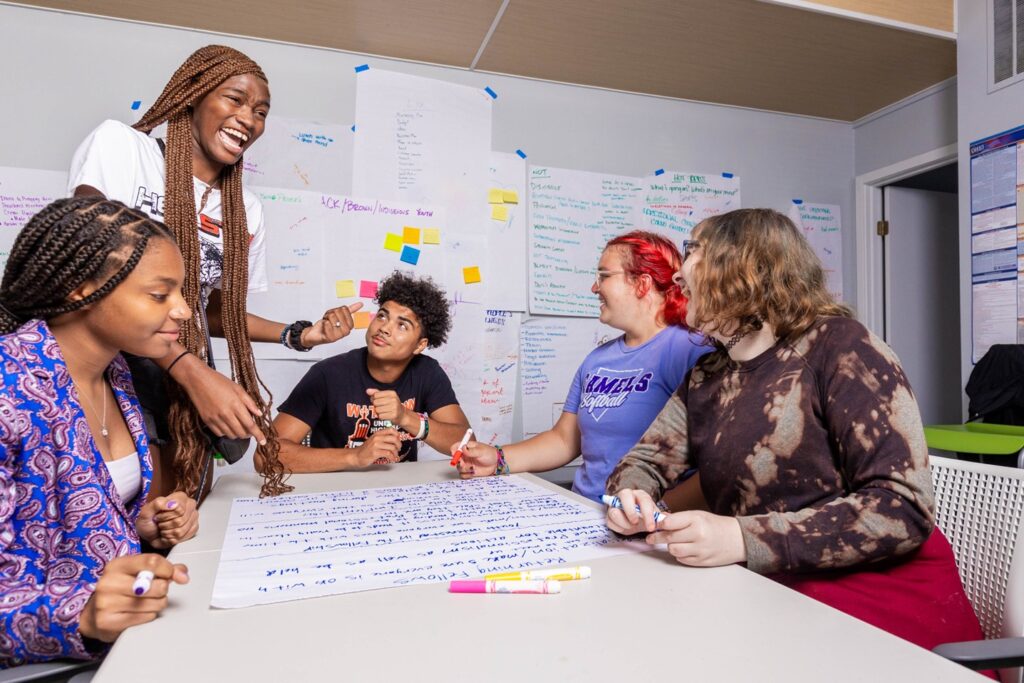Jill Miller, President & CEO, Bethesda, Inc. & bi3 Fund
Jennifer Zimmerman, Vice President, Evaluation & Impact, bi3 Fund
As youth mental health challenges continue to grow nationwide, a new initiative in Greater Cincinnati believes transformational change begins when youth are empowered to lead.
Hopeful Empowered Youth (HEY!) is a diverse coalition of community groups, health care providers, educators, policymakers, families, and most importantly, young people themselves, working collaboratively to create a community that supports the well-being of all youth from ages 0-24 in Greater Cincinnati, especially those facing the greatest barriers and disparities. It is committed to creating a culture where youth experience optimal mental health, are free from stigma, and have the support they need to thrive.
From Fall 2022 through mid-2024, funders and community partners progressed from early convenings to launching the HEY! collaborative fund, hiring strategic consultants, and completing a community-driven needs assessment. This foundation led to branding HEY!, developing infrastructure such as the Youth Fellowship and steering committee, hiring the first executive director in June 2024, and launching Youth Fellows 2.0 into the community that September. Over the following year, HEY! continued to expand staff and launch several initiatives, including Schools of Wellness, Safe Adults and Spaces Rubrics, and the Youth Mental Health Corps.
Rather than approaching the mental health crisis with traditional top-down strategies, HEY! centers youth experiences and leadership while uniting different sector partners to reimagine how communities can better support young people’s wellness and belonging.
A Crisis That Demands a Collective Response
Youth in Greater Cincinnati and across the country continue to face numerous mental health challenges. Although reports of anxiety and depression are declining, the rates remain high, continuing to strain systems like health care, education, housing, and juvenile justice. Sustainable solutions require collective action, grounded in equity, shared power, and the voices of those most affected.
HEY! was created from this understanding. It aims to go beyond short-term efforts and promote community-wide change through prevention, inclusion, and collaboration.
Building HEY! from the Ground Up
The initiative began when two Cincinnati-based health funders, bi3 and Interact for Health, convened a broad group of partners, including other funders, health care providers, educators, nonprofit and business leaders, and policymakers.
They started by listening to the youth. There were seven focus groups with youth representing populations experiencing the greatest disparities in mental health (high school, LGBTQIA+, rural, Black and Latino, as well as those with experience in public systems like foster care and juvenile court). Through that process, the collaborative learned how youth defined mental health, the challenges they were facing, what they wanted people to know and do, and their vision for a community that would support their wellbeing.
“I’ve never been a part of something that has been so youth-centered, where our voices have been valued so much that I look at the adults in the room and they all look at you like, I want to hear what you like have to say.”
-Ella Hardesty, HEY! Youth Fellow

Following the initial listening sessions, HEY! continued a commitment to include youth as equal partners that is reflected in its mission and values, and focuses on engaging youth at every step in the process of co-designers and decision makers.
Rather than relying on occasional listening sessions or focus groups, the initiative embedded youth voice into every stage of its development. By establishing a Youth Fellowship Program and youth-led committees, young people gained the power to influence priorities, craft strategies, and even choose the name for the initiative. “HEY!” was selected by the youth themselves to embody a spirit that was youth-centered, welcoming, and straightforward. Youth have also played a key role in shaping the design of the Youth Fellows program itself, developing policies, conducting training, and creating projects.
The result was a shared vision: a community where youth are supported by caring adults, connected to safe and inclusive spaces, and empowered to lead change in their own lives and communities.
Now, HEY! is rooted in a collective impact framework where youth, providers, experts, and community members come together with the mission to develop strategies and approaches. A Steering Committee of community leaders and youth provides guidance and direction. Work Groups move strategies and programs forward. Backbone staff keep things running and offer support and technical assistance.
Funders Take a New Approach
The role of funders in HEY! was markedly different from traditional philanthropic models. Instead of directing strategy from the top, funders embraced a trust-based philanthropy approach, listening more than leading, offering flexible financial support, and actively working to address power dynamics.
This meant changing how power traditionally flows, typically from funders to grantees to program participants, and instead fostering open dialogue, shared decision-making, and long-term relationship-building.
Funders involved in HEY! recognized that transformational change required letting go of control, being transparent about decisions, and creating space for youth leadership to flourish. So, while funders provide operational and program funds, the Steering Committee makes decisions about how the funds are allocated. Time and trust became essential ingredients. It took time to build authentic relationships and a culture of mutual respect, and it requires ongoing maintenance. But through this process, funders and community partners alike began to shift from being drivers of strategy to supporters of a broader, youth-led movement.
What Youth Say They Need
One of the clearest insights from HEY! has been the difference in priorities between adults and youth when it comes to mental health. While adult-led systems often focus on increasing access to clinical treatment, youth desired a stronger emphasis on wellness, connection, and prevention.
“I think prioritizing self-care and the day-to-day, things that really make up a lot of a youth or teen’s life, contributes to the state of their mental health. Rather than only focusing on treatment, which is still important, HEY! emphasizes how often teens are getting checked on by someone they trust or just having access to places where they can make friends in the first place.”
Amaya Boyd-HEY! Youth Fellow
Through the Youth Fellowship and community engagement efforts, several recurring themes emerged. Young people want:
- A focus on mental wellness, not just crisis intervention.
- Safe spaces in schools, online, and in their neighborhoods. Youth created criteria for determining safe spaces, which include accessibility, an inclusive atmosphere, and engaging activities and resources.
- More access to trusted, caring adults and supportive peers.
- Representation in decisionmaking that affects their lives.
These insights have shaped HEY!’s core strategies, which include building supportive school environments, creating opportunities for youth leadership, addressing disparities, and reducing stigma.
HEY! has made progress in several of the strategy areas, including:
- The Treatment Work Group launched the Greater Cincinnati Youth Mental Health Corps, nearly doubling the number of youth peer supporters in Ohio by recruiting 24 new young adults with lived experience in behavioral health, foster care, and justice systems.
- Launched 11 inaugural “Schools of Wellness” in Ohio and Kentucky, completing self-assessments of wellness practices. Each will select a priority wellness dimension, engage stakeholders, and choose a program or capital improvement, making real, data-informed changes for students.
- Tracking progress: Greater Cincinnati will be the first region in the nation to measure youth belonging and agency at a population level. In 2024, the first nationally representative data were released in the Youth Mental Health Tracker on youth belonging and agency.
- The Community & Caregivers Work Group is designing a new Safe Adults cohort, bringing together youth-serving organizations for 12–18 months of training, funding, and coaching to become more youth-led and equity-centered. They are also developing a definition of “safe adults” and seeking to apply and operationalize the definition and rubric of safe spaces designed by the youth.
Lessons for Other Funders and Communities
HEY! is still growing, but it offers valuable lessons for communities across the country that are seeking to improve youth mental health in lasting, equitable ways.
Among the lessons:
- Invest in youth leadership: Real change starts when youth are heard and given the resources and power to lead. HEY! adult leaders must be intentional about listening to youth and constantly reorient themselves to youth priorities. Often, adults can easily go back to what they think is important.
- Build trust-based collaborations: Sharing power across sectors and with young people leads to more responsive, practical solutions.
- Rethink metrics and success: Traditional metrics often miss what truly matters to youth. Communities must be willing to measure success on youth-defined terms. Currently, community metrics focus on mental illness and are not aligned with the priorities identified by youth (belonging, agency, safe adults). HEY! now measures:
- Youth sense of belonging and agency
- Increased number of trusted adults in youth lives
- Improved youth behavioral health
- Rethink metrics and success: Traditional metrics often miss what truly matters to youth. Communities must be willing to measure success on youth-defined terms. Currently, community metrics focus on mental illness and are not aligned with the priorities identified by youth (belonging, agency, safe adults). HEY! now measures:
HEY! is not just an initiative; it’s a new way of thinking about how systems and communities support young people. It challenges communities to move beyond band-aid solutions and toward a future where youth mental health and wellbeing are protected, prioritized, and promoted by everyone, including funders, schools, mental health providers, community-based organizations, families, and peers.
Looking Ahead
Early impact of HEY! shows what’s possible when young people are placed at the center of the work meant to support them. It reminds funders, professionals, and adults of all kinds that solutions built with youth, not just for them, have the power to transform systems and lives.

